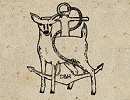Contact Seller
Doe And Hope
Tel07729 213013Please quote Antiques Atlas.


 Taxidermy Golden Pheasant (Christopholous Pixtus)
Taxidermy Golden Pheasant (Christopholous Pixtus)
 Taxidermy Golden Pheasant (Christopholous Pixtus)
Taxidermy Golden Pheasant (Christopholous Pixtus)
 Vintage Taxidermy Swan on Marble & Mahogany Base
Vintage Taxidermy Swan on Marble & Mahogany Base
 Taxidermy Rare White Leucistic Crow by Bytheway
Taxidermy Rare White Leucistic Crow by Bytheway
 Pair Of Taxidermy Ruddy Shelduck
Pair Of Taxidermy Ruddy Shelduck
 A Glass case containing Display of Amazonian Birds
A Glass case containing Display of Amazonian Birds
 Cased Taxidermy Herons by John Shaw c.1870
Cased Taxidermy Herons by John Shaw c.1870
 Taxidermy Jay Bird
Taxidermy Jay Bird
 Taxidermy Cased Jay
Taxidermy Cased Jay
 A great Victorian Taxidermist's study of a Buzzard
A great Victorian Taxidermist's study of a Buzzard
 Taxidermy Cased Pheasant And Companion .
Taxidermy Cased Pheasant And Companion .
 Taxidermy Kingfisher Late 19th Century
Taxidermy Kingfisher Late 19th Century
Non UK callers :
+44 7729 213013
Fine Pair of Taxidermy Snipes by Cullingford 1898


The beautifully preserved male and female common european snipes (Gallinago gallinago) poised in opposing positions, the female stood, with the male rendered in flight, housed within a typical Cullingford glazed museum case being square and faux oak painted, the interior beautifully sparse with buff paper backing and lacking in simulated habitat, the whole preserved by Joseph Cullingford of Durham on September 3rd 1898, and signed and dated thus.
The overall composition is of a very high quality and the specimens are in good condition with expected light fade to the plumage but nothing out of the ordinary. The glazing and case are all original and the rest of the composition is very well preserved with expected light wear to the case and light spotting to the paper and inner glass, with a hanging hook added for wall mounting. The signature and date to the bottom left facing corner is clear and is typically in pencil reading ‘Winnet, Sep. 3rd, 1898, J Cullingford’. We are not entirely sure what the mark for ‘Winnet’ is as it doesn’t appear to be a place name, it may well read ‘winner’ if it had been entered into a taxidermists competition at the time or it may be the surname of a client who commissioned it. Further research may prove fruitful in this regard.
Snipe are medium sized, skulking wading birds with short legs and long straight bills. Both sexes are mottled brown above, with paler buff stripes on the back, dark streaks on the chest and pale under parts. They are widespread as a breeding species in the UK. During the breeding season snipe are best look for on moorland, especially on early spring mornings when males can be heard giving their 'drumming' or 'bleating' display.
Joseph Cullingford (one of three brothers) of Durham was responsible for some of the finest taxidermy crafted during the late Victorian period and was appointed Curator of the University Museum, Palace Green, Durham in 1877. Although clearly operating on a commercial basis, Cullingford was employed at the Museum throughout most of his working life. From his Headed notepaper, it seems he had an arrangement enabling him to work privately whilst in the museum's employ.
An exquisite piece of artful taxidermy for the purist.
SellerDoe And Hope
View all stock from
Doe And Hope

 Private dealer, By appointment only
Private dealer, By appointment only
The Onion Barn, Shoe Cottage,
15 High Street, Blunham,
Bedfordshire, MK44 3NL.
MK44 3NL
Tel : 07729 213013
Non UK callers : +44 7729 213013
Get directions to Doe And Hope
The overall composition is of a very high quality and the specimens are in good condition with expected light fade to the plumage but nothing out of the ordinary. The glazing and case are all original and the rest of the composition is very well preserved with expected light wear to the case and light spotting to the paper and inner glass, with a hanging hook added for wall mounting. The signature and date to the bottom left facing corner is clear and is typically in pencil reading ‘Winnet, Sep. 3rd, 1898, J Cullingford’. We are not entirely sure what the mark for ‘Winnet’ is as it doesn’t appear to be a place name, it may well read ‘winner’ if it had been entered into a taxidermists competition at the time or it may be the surname of a client who commissioned it. Further research may prove fruitful in this regard.
Snipe are medium sized, skulking wading birds with short legs and long straight bills. Both sexes are mottled brown above, with paler buff stripes on the back, dark streaks on the chest and pale under parts. They are widespread as a breeding species in the UK. During the breeding season snipe are best look for on moorland, especially on early spring mornings when males can be heard giving their 'drumming' or 'bleating' display.
Joseph Cullingford (one of three brothers) of Durham was responsible for some of the finest taxidermy crafted during the late Victorian period and was appointed Curator of the University Museum, Palace Green, Durham in 1877. Although clearly operating on a commercial basis, Cullingford was employed at the Museum throughout most of his working life. From his Headed notepaper, it seems he had an arrangement enabling him to work privately whilst in the museum's employ.
An exquisite piece of artful taxidermy for the purist.
Price The price has been listed in British Pounds.
Conversion rates as of 23/JAN/2025. Euro & Dollar prices will vary and should only be used as a guide.
Always confirm final price with dealer. Phone or visit the website to buy, Free UK shipping.
Category Antique Taxidermy
Date c.1898
Late Victorian Antiques Origin English
Item code as155a1664 / 1720
Status Sold
£1850.00 
$2279.94 
€2192.62 

$

€

Conversion rates as of 23/JAN/2025. Euro & Dollar prices will vary and should only be used as a guide.
Always confirm final price with dealer. Phone or visit the website to buy, Free UK shipping.
View all stock from
Doe And Hope

 Private dealer, By appointment only
Private dealer, By appointment onlyThe Onion Barn, Shoe Cottage,
15 High Street, Blunham,
Bedfordshire, MK44 3NL.
MK44 3NL
Tel : 07729 213013
Non UK callers : +44 7729 213013
Get directions to Doe And Hope
You may also be interested in
 Taxidermy Golden Pheasant (Christopholous Pixtus)
Taxidermy Golden Pheasant (Christopholous Pixtus)
 Taxidermy Golden Pheasant (Christopholous Pixtus)
Taxidermy Golden Pheasant (Christopholous Pixtus)
 Vintage Taxidermy Swan on Marble & Mahogany Base
Vintage Taxidermy Swan on Marble & Mahogany Base
 Taxidermy Rare White Leucistic Crow by Bytheway
Taxidermy Rare White Leucistic Crow by Bytheway
 Pair Of Taxidermy Ruddy Shelduck
Pair Of Taxidermy Ruddy Shelduck
 A Glass case containing Display of Amazonian Birds
A Glass case containing Display of Amazonian Birds
 Cased Taxidermy Herons by John Shaw c.1870
Cased Taxidermy Herons by John Shaw c.1870
 Taxidermy Jay Bird
Taxidermy Jay Bird
 Taxidermy Cased Jay
Taxidermy Cased Jay
 A great Victorian Taxidermist's study of a Buzzard
A great Victorian Taxidermist's study of a Buzzard
 Taxidermy Cased Pheasant And Companion .
Taxidermy Cased Pheasant And Companion .
 Taxidermy Kingfisher Late 19th Century
Taxidermy Kingfisher Late 19th Century







